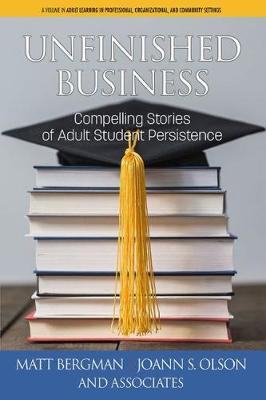Adult Learning in Professional, Organizational, and Community Settings
1 total work
For at least the last 100 years, more than 40% of all students who enrolled in American colleges and universities have not persisted to graduation at four-year institutions. Their stories are varied, but in every case, something got in the way of that pursuit. Life happened. They became one of the nearly 36 million Americans who have some college but no degree.
For many, the stigma of not finishing college is a closely held secret that weighs heavily as they discuss, engage, and compete to meet the challenges of the workforce in the 21st century. Some weren't ready at age 18 for the focus and commitment that academic studies require. Others found opportunities to create income and meet immediate familial needs or requirements. Many have excelled despite their lack of a college credential. Contrary to the deficit mindset that often permeates the retention and persistence discourse, this book highlights the stories of those who successfully returned to what was left unfinished.
The stories here may challenge your assumptions. These are high-quality students who demonstrated a compelling and inspiring commitment to their education, begun long ago and now completed-in some cases decades later. As you read, don't miss the role that engaged advisors, supportive family members, and well-designed programs such as prior learning assessment played in helping students to the finish line. These narratives also demonstrate that it is time for institutions of higher education to imagine and embrace new ways of serving these students well.
For many, the stigma of not finishing college is a closely held secret that weighs heavily as they discuss, engage, and compete to meet the challenges of the workforce in the 21st century. Some weren't ready at age 18 for the focus and commitment that academic studies require. Others found opportunities to create income and meet immediate familial needs or requirements. Many have excelled despite their lack of a college credential. Contrary to the deficit mindset that often permeates the retention and persistence discourse, this book highlights the stories of those who successfully returned to what was left unfinished.
The stories here may challenge your assumptions. These are high-quality students who demonstrated a compelling and inspiring commitment to their education, begun long ago and now completed-in some cases decades later. As you read, don't miss the role that engaged advisors, supportive family members, and well-designed programs such as prior learning assessment played in helping students to the finish line. These narratives also demonstrate that it is time for institutions of higher education to imagine and embrace new ways of serving these students well.
